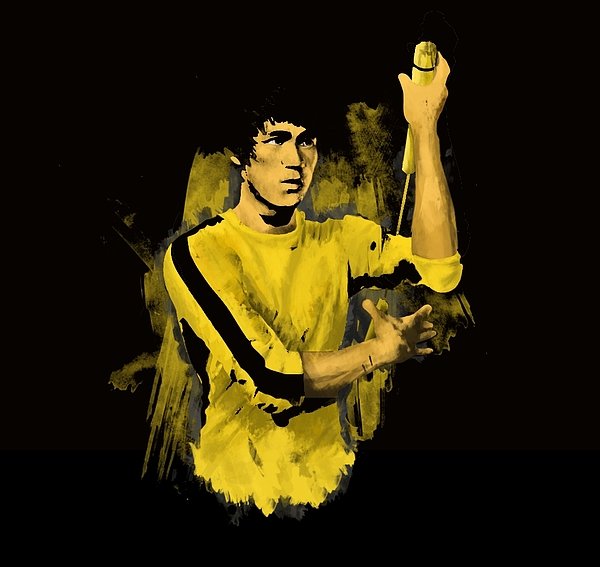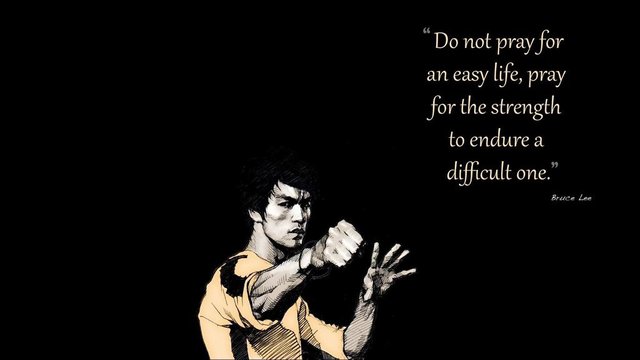The Philosophy of Bruce Lee (part 2)

This is the second part of a three-part series on Bruce Lee's philosophy.
You can read part 1 here: https://steemit.com/philosophy/@chhaylin/bruce-lee-s-philosophy-is-fundamentally-taoist-and-libertarian-in-nature-part-1
In my previous post I identified the following two attributes of Bruce Lee's philosophy:
1. Be one with the Tao; be formless like water, and be pliable.
2. Break rules and conventions and have no way as your way.
I will continue with the next attribute, which is
3. Empty your cup and learn the art of dying
To empty your cup means to get rid of your self-delusion so that you can look at the world from a new and refreshed perspective. In order to find your true potential and your nature, you should first be self-conscious. You should know what you want, what you desire, what your strengths and weaknesses are, your pride, your fears, your accomplishments, your ambitions and eventually get rid of all that as they maintain an ego that interferes with who you truly are – a fluid personality who cannot be narrowly defined by your desires, fears, achievements etc.
In the Taoist scripture, Tao Te Ching, one can read:
Empty yourself of everything.
Let the mind become still.
The ten thousand things rise and fall while the Self
watches their return. (Tao Te Ching, Chapter 16)
This is frightening for most of us, because it confronts us with our own prejudices; we may find that our traditions that have previously given us a sense of security may be baseless. However, Bruce Lee did not only want us to break with the archaic, but he also showed us an alternative – a way of creating new values and skills to supersede the old. In this respect, Bruce Lee’s views of how to progress in life is very much in line with the iconoclastic Nietzschean Übermensch: we must first break with traditions and try to rise above our culture so that a higher being can emerge from our renewed self-creation. This is how I personally interpret Bruce Lee’s saying that we should learn the “art of dying”.
In a famous scene in Longstreet, Bruce Lee taught us not to make a plan of fighting, he told us to empty our mind, and to be formless like water. The “art of dying” is the “art of being non-fixed” – the art of being a different person tomorrow than we are today by letting go our past attachments including our ambitions. I believe it is similar to the Nietzschean ideal of self-creation: continuously subjecting our current values to our personal judgements, breaking down ‘lower values’ and creating ‘higher values’. The art of dying is hence a metaphor for continuously breaking down our past selves, values, attachments, pride, desires (dying) and creating our new selves (being reborn) so that we can continuously improve. The “art of dying” is therefore also the “art of self-forgetfulness”, a skill that is characteristic of the ‘baby’ who is its self-propelling wheel in Nietzsche’s story of the ‘three metamorphoses’ from Thus Spoke Zarathustra.
Bruce Lee explains the "art of dying" in the following scene in Longstreet:
Bruce Lee wrote:
Empty your cup so that it may be filled: become
devoid to gain totality. (Bruce Lee, 1975, p. 14)
Emptying our cup precedes our discovery of new truths or new values so that hopefully we can find ourselves and become our own standard. Bruce Lee told us not to despair when we cannot find solace within our past attachments as the creation of personal values is vastly more valuable.
See here a great explanation of ‘emptying our cup’:
The logical consequence of self-creation is that one becomes his own standard.
4. Be your own standard and accept life
According to Bruce Lee, we should not worry about what others think of us. He advised us not to look for a personality to duplicate as that would be a betrayal to our selves – one might call this practice ‘other-expression’ instead of ‘self-expression’. Being our own standard also encompasses the acceptance of disgrace and losses as much as accepting grace and victories. How else can we accept ourselves and grow into our own standard? From our own acceptance we can find our rightful place in the world.
The Tao Te Ching advises us the following:
Accept disgrace willingly.
Accept misfortune as the human condition.
What do you mean by “Accept disgrace willingly”?
Accept being unimportant.
Do not be concerned with loss or gain.
This is called “accepting disgrace willingly.”
What do you mean by “Accept misfortune as the human condition”?
Misfortune comes from having a body.
Without a body, how could there be misfortune?
Surrender yourself humbly; then you can be trusted to care for all things.
Love the world as your own self; then you can truly care for all things. (Tao Te Ching, Chapter 13)

5. Wei Wu Wei
Lastly, I would like to discuss another aspect of ‘having no way as your way’. To have ‘no way as your way’, is also Bruce Lee’s expression for following the Taoist doctrine of ‘wei wu wei’ (‘action without action’ or ‘effortless action’). Bruce Lee maintained that when a person is truly in control of himself, he experiences his action without consciously forcing his actions to happen. Self-consciousness is initially required for the understanding of ourselves, but to be truly expressing ourselves through our actions we must move into a state where we act unconsciously. I think it is best comparable with the English expression of ‘being in a state of flow’. Bruce Lee said:
I’m moving and not moving at all. I’m like the moon underneath the waves that ever go on rolling and rocking. It is not, ‘I am doing this,’ but rather, an inner realization that ‘this is happening through me,’ or ‘it is doing this for me.’ The consciousness of self is the greatest hindrance to the proper execution of all physical action. (Bruce Lee, 1975, p. 7)
This idea of Bruce Lee can also be found within the wisdom of the Tao Te Ching:
Tao abides in non-action (‘wu wei’),
Yet nothing is left undone. (Tao Te Ching, Chapter 37)
Thus far, I have shown that Bruce Lee's philosophy is fundamentally Taoist in nature.
Nice to see great subjects such as Bruce Lee being brought back into the public perception for his beliefs and rules. My brother in law was a big fan. Thanks for the memories and new meanings.
You're welcome! :) I appreciate the fact that you like the article.
Undoubtedly was a great character especially in the art of kun fu.
Thank you for bringing some depth to the Steemit community!
Thank you for your comment. I appreciate it. :)
Thank you for these posts! Bruce Lee is my favorite philosopher of the twentieth century and this is an excellent summing up of his views!